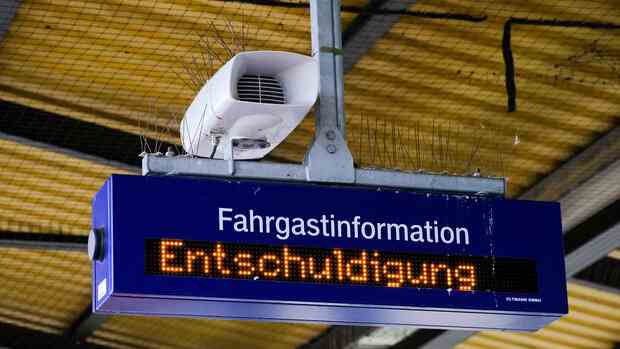Numerous trains and flights will be canceled on Monday.
(Photo: IMAGO/Michael Gstettenbauer)
Berlin The Verdi and EVG unions are calling on workers to go on massive warning strikes on Monday, which are intended to largely paralyze traffic in Germany. The reason for this is what they see as deadlocked collective bargaining for the public sector and at Deutsche Bahn. Negotiations are currently also being made for security personnel at airports and regionally for ground handling services and local public transport.
What will be the impact of the industrial action and what will it mean for workers? The most important questions and answers:
How long will the strike last?
According to the unions, the strike should usually start at 00:00 on Sunday night and end at 24:00 on Monday. Significant disruptions can also occur before or after the strike, for example if night shift workers still take part in the walkout or if trains or planes are not at their regular place of departure after the end of the strike.
There has been a strike at Munich Airport since Sunday morning, so there will be no regular air traffic for two days. Elsewhere, too, some employees have been called to industrial action on Sunday.
>> Read here: Munich Airport has been idle for two days since Sunday morning due to warning strikes
Which trains are still running?
Probably very few. Deutsche Bahn has already announced that there will be no long-distance traffic on Monday and that only a few regional trains will be running. The EVG has also called on employees of other railway companies to go on strike, where it is conducting collective bargaining. These include Transdev, AKN, Erfurter Bahn, Osthannoversche Eisenbahnen, Erixx, VLEXX, Eurobahn and Die Länderbahn.
What about public transport?
Massive failures can also occur on the S-Bahn if it is operated by Deutsche Bahn, as is the case in Berlin. In Baden-Württemberg, Hesse, Lower Saxony, North Rhine-Westphalia, Rhineland-Palatinate and Saxony, the transport companies are in municipal hands, so that buses and trains can be on strike here. The same applies in Bavaria, where a collective agreement for local transport is currently being negotiated.
Rail traffic is largely canceled on Monday.
(Photo: dpa)
Is it worth switching to the car?
The car is not a safe alternative to public transport on Monday. Because Verdi has also called on those employees of the motorway company who are responsible for the safety of the tunnels to strike.
The motorway company announced that emergency service agreements would be used to avoid tunnel closures. To what extent this will succeed is an open question. Verdi deputy boss Christine Behle had explained that the union wanted to target the Elbe tunnel in Hamburg, for example.
>> Read also: Employees should note this on Monday
Can you still fly on Monday?
Munich Airport will stop regular passenger traffic on Sunday and Monday, in Frankfurt and Hamburg this largely applies to Monday. The airports in Düsseldorf, Cologne/Bonn, Hanover and Stuttgart were still trying to maintain flight operations on Friday, but warned passengers of numerous flight cancellations.
What about freight transport?
This will also be partially affected because, for example, inland waterway transport can be adversely affected if the lock attendants walk out, and employees in seaports such as Hamburg are also called upon to walk out. Significant impairments can also occur in the transport of goods by rail and on the road.
More: Unions are demanding double-digit wage increases for public employees
